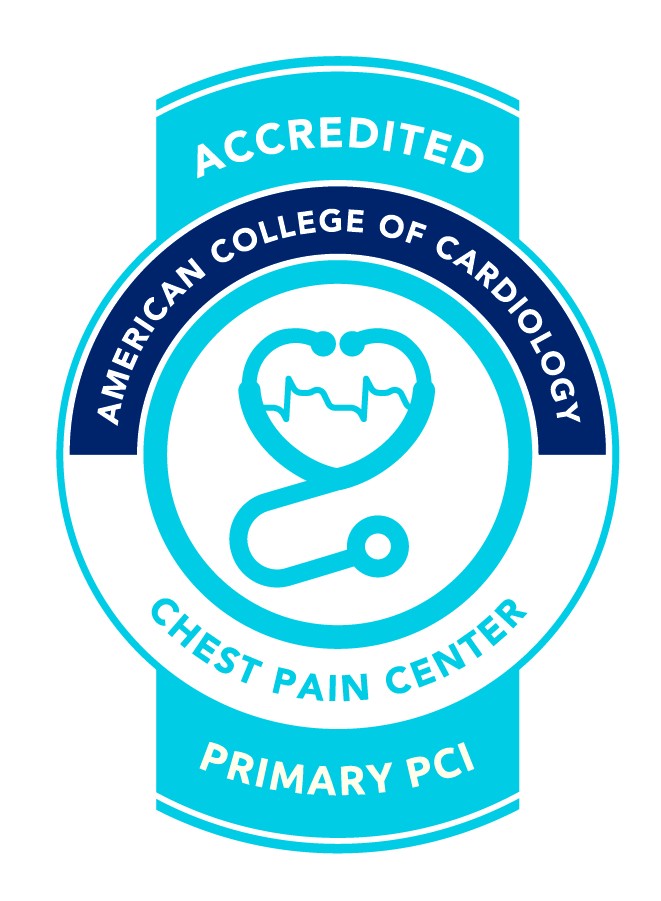St. James Receives ACC Chest Pain Center with Primary PCI Accreditation
St. James is now one of only three hospitals in Montana with ACC Chest Pain Center with Primary PCI Accreditation, joining its sister hospital St. Vincent Healthcare in Billings, Mont., and Community Medical Center in Missoula, Mont.

The American College of Cardiology has recognized St. James Healthcare for its demonstrated expertise and commitment to treating patients with chest pain. St. James Healthcare was awarded Chest Pain Center Accreditation with Primary PCI in July based on a rigorous onsite evaluation of the staff’s ability to evaluate, diagnose and treat patients who may be experiencing a heart attack.
Percutaneous coronary intervention (PCI) is also known as coronary angioplasty. It is a non-surgical procedure that opens narrowed or blocked coronary arteries with a balloon to relieve symptoms of heart disease or reduce heart damage during or after a heart attack.
Hospitals that have earned ACC Chest Pain Center with Primary PCI Accreditation have proven exceptional competency in treating patients with heart attack symptoms and have primary PCI available 24/7 every day of the year. As required to meet the criteria of the accreditation designation, they comply with standard Chest Pain Center protocols. They are equipped with a robust hypothermia program for post-cardiac arrest treatment. These facilities maintain a "No Diversion Policy" for out-of-hospital cardiac arrest patients.
“St. James has demonstrated its commitment to providing southwest Montana with excellent heart care,” said Deepak L. Bhatt, MD, MPH, FACC, chair of the ACC Accreditation Management Board. “ACC Accreditation Services is proud to award St. James Healthcare with Chest Pain Center with Primary PCI Accreditation.”
Hospitals receiving Chest Pain Center with Primary PCI Accreditation from the ACC must take part in a multi-faceted clinical process that involves: completing a gap analysis; examining variances of care, developing an action plan; a rigorous onsite review; and monitoring for sustained success.
Improved methods and strategies of caring for patients include streamlining processes, implementing guidelines and standards, and adopting best practices in the care of patients experiencing the signs and symptoms of a heart attack. Facilities that achieve accreditation meet or exceed an array of stringent criteria and have organized a team of doctors, nurses, clinicians, and other administrative staff that earnestly support the efforts leading to better patient education and improved patient outcomes.

Achieving this accreditation reflects the dedication, commitment, and clinical excellence of our cardiologists, Emergency Department providers, nurses, technicians, and the St. James Cardiovascular Team. We know that the people of southwest Montana look to us for help in their times of need, and we take that responsibility seriously as we strive to deliver the highest-quality cardiovascular care to our patients.

St. James Healthcare recently complete a two-lab cardiac catheterization suite, thanks in large part to a $4.68 million grant from The Leona M. and Harry B. Helmsley Charitable Trust. The new cardiac catheterization suite has allowed the hospital to provide the communities of southwestern Montana with improved access to high-quality cardiovascular care, resulting in better patient outcomes.
According to the Centers for Disease Control and Prevention, more than 730,000 Americans yearly suffer a heart attack. The most common symptom of a heart attack for both men and women is chest pain or discomfort. However, women are more likely to have atypical symptoms. Other heart attack symptoms include, but are not limited to, tingling or discomfort in one or both arms, back, shoulder, neck or jaw, shortness of breath, cold sweat, unusual tiredness, heartburn-like feeling, nausea or vomiting, sudden dizziness and fainting.
The ACC offers domestic and international hospitals like St. James Healthcare access to a comprehensive suite of cardiac accreditation services designed to optimize patient outcomes and improve hospital financial performance. These services are focused on all aspects of cardiac care, including emergency treatment of heart attacks.
About St. James Healthcare and Intermountain Healthcare
St. James Healthcare has served the people of Southwestern Montana for more than 135 years and is the largest and only acute care health care facility in the region. St. James Healthcare is a 67-bed hospital located in Butte, Montana, with more than 450 caregivers, alongside 100 physicians and advanced care professionals, offering 24-hour care and dozens of progressive specialty services. St. James Healthcare is part of the Intermountain Healthcare system. Based in Utah with locations in seven states (Montana, Colorado, Idaho, Kansas, Nevada, Utah, and Wyoming) and additional operations across the western U.S., Intermountain Healthcare is a nonprofit healthcare system comprised of 33 hospitals, 385 clinics, medical groups with some 3,800 employed physicians and advanced practice providers. To help people live the healthiest lives possible, Intermountain is committed to improving community health and is widely recognized as a leader in transforming healthcare by using evidence-based best practices to consistently deliver high-quality outcomes at sustainable costs. To learn more about St. James Healthcare, visit sjh-mt.org.
About the American College of Cardiology
The American College of Cardiology envisions a world where innovation and knowledge optimize cardiovascular care and outcomes. As the professional home for the entire cardiovascular care team, the mission of the College and its 54,000 members is to transform cardiovascular care and to improve heart health. The ACC bestows credentials upon cardiovascular professionals who meet stringent qualifications and leads in the formation of health policy, standards and guidelines. The College also provides professional medical education, disseminates cardiovascular research through its world-renowned JACC Journals, operates national registries to measure and improve care, and offers cardiovascular accreditation to hospitals and institutions. For more, visit acc.org.



